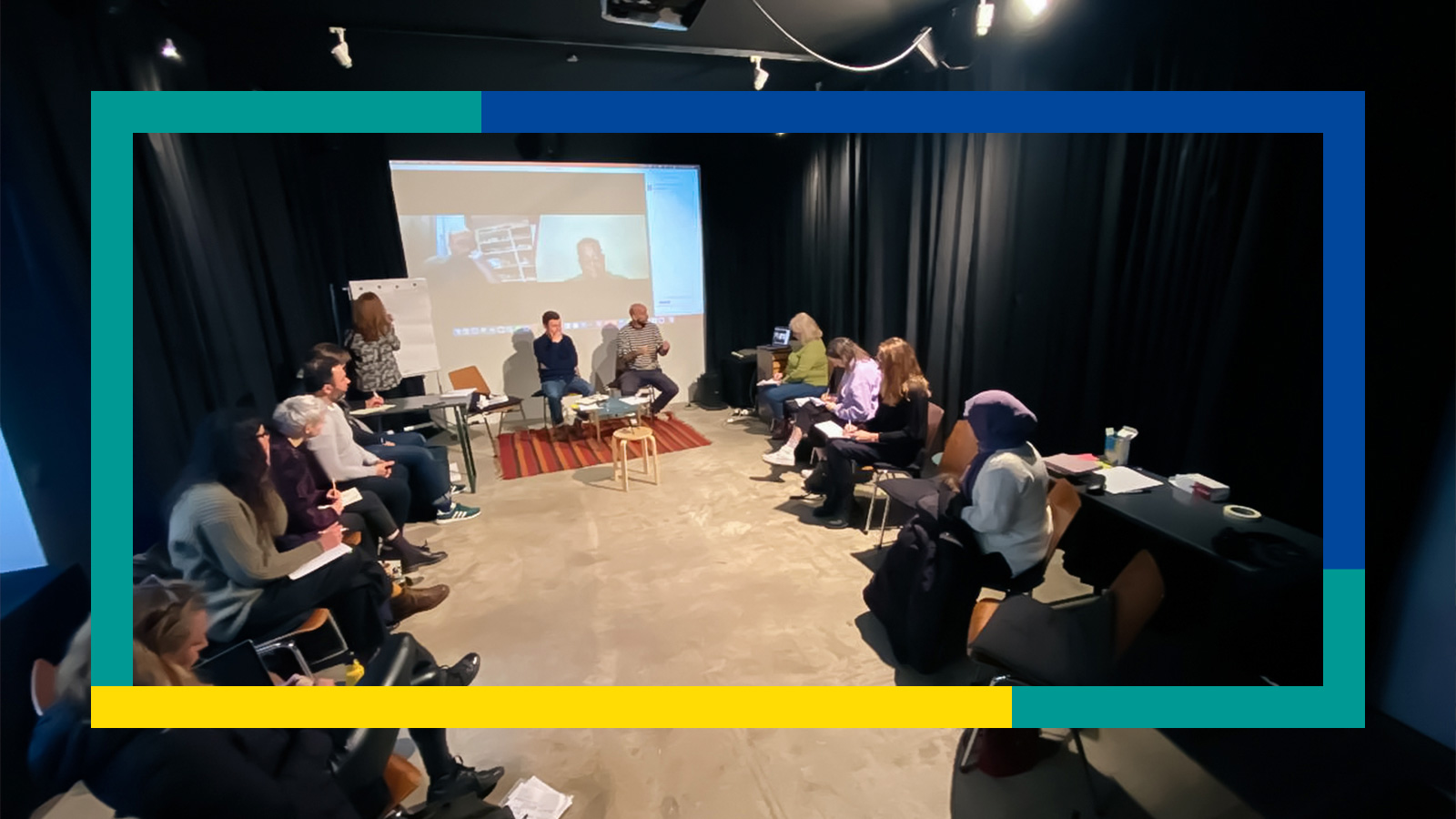
Collaborative Incubator
The incubator is an in-person learning space for socially engaged artists and investigative journalists to think and debate for several days about process and methods when it comes to storytelling and representation of migrants. Guest speakers lead discussions and offer critical provocations around specific themes and topics that constitute the programme.
The Collaborative Incubator by Beyond the Now brings socially engaged artists who have experienced migration and displacement together with investigative journalists and digital activists as part of the Re:framing Migrants in the European Media.
The goal is to combine the skills and methodologies of socially engaged art, journalism, and digital activism to co-design a series of collaborative commissions that tell the story of migration from a systemic perspective. The incubator supports practitioners who have lived experience of displacement or are shaped by inter-generational histories of migration. The aim is to move beyond individualistic morality tales to research, map and communicate a more interconnected, systemic story about displacement, which comprises intricate relationships between various sectors and actors.
Beyond the Now: Collaborative Incubator
This pilot project is designed around 3 inter-linked activities:
a)The delivery of a collaborative incubator space;
b)Place-based pilot commissions between socially engaged artists, investigative journalists and digital activists and;
c)The production, showcasing and launch of an online Toolkit.
These activities were collectively designed to open a critical and reflective space for a form of storytelling that is migrant-led, facilitating (un)learning, collaboration, discussion and (re)imagining. The aim was to explore:
● Storytelling practices nurtured through the lens of everyday realities of displacement and place-based perspectives;
● The production of new stories from the ground-up about ‘what is Europe’ through radical acts of creative and civic imagination.
The project specifically collaborated with practitioners and actors who have lived-experience of displacement and/or diversely shaped by generational histories of migration.
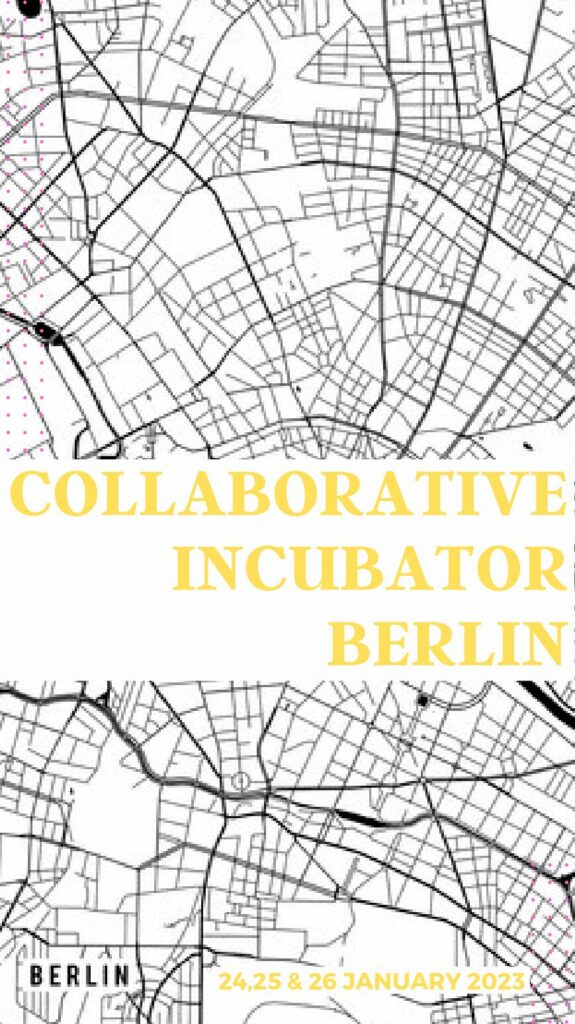
The Collaborative Incubator
The premise of the ‘collaborative incubator’ which lies at the heart of this work package was to bring together socially engaged artists and investigative journalists alongside digital activists to facilitate experimentation and risk-taking (mixing methodologies and approaches to storytelling), and for new collaborative alliances to be formed.
The Collaborative Incubator consisted of three stages. The first two stages, Collaborative Incubator 1 and 2 were held online across the months of November and December 2022.
Collaborative Incubator 1 included investigative journalist, Ismail Einashe, socially engaged artist, Dana Olarescu and digital activist, Hossein Derakhshan who responded to the following questions.
Ismail Einashe – Investigative Methods and Ways of Working
- What is your first instinct when you begin a project – how do you begin to move into a ‘story’ – how would you describe your way of working (method). Do you draw on ‘instinct’ or ‘research’. How do you move into and orientate yourself to the people and the place where you think the potential storylines or situations lie?
- As an investigative journalist, you often work alongside and with communities and people who are vulnerable and in some instances traumatised because of displacement. How does an awareness of human trauma play a conscious part of your method and mode of storytelling?
- As an investigative journalist, do you think you have anything to learn from and share with methods practiced by socially engaged artists and digital designers and activists?
Dana Olarescu – Place-based, Socially Engaged Artist and Designer
- What is your first instinct when you begin a project – how do you begin to move into a ‘place or anticipated story’ – how would you describe your way of working (method). Do you draw on ‘instinct’ or ‘research’. How do you move into and orientate yourself to the people and the place where you think the potential storylines or situations lie?
- As a socially engaged artist, how do you define the notion of ‘place’ when working with and alongside people and communities who have been displaced? As an artist working in a socially engaged context and methodology, what is the relevance (or not) of place and ‘displacement’ in your work?
- As a socially engaged artist, do you think you have anything to learn from and share with methods practiced by an investigative journalist or digital designer?
Hossein Derakshin – Artist, Researcher, Information Designer
- What is your first instinct when you begin a project – how do you begin to move into a ‘place or anticipated story’ – how would you describe your way of working (method). Do you draw on ‘instinct’, ‘or research’. How do you move into and orientate yourself to the people and the place where you think the potential storylines or situations lie?
- What role does the investigative method play in raising the invisible storytellers? And how do you re-gain a sense of identity in a colonized space – both virtual and non-virtual? How do you bring a sense of place into your practice?
- As an artist, researcher and information designer, do you think you have anything to learn from and share with methods practiced by an investigative journalist or socially engaged artist?
Collaborative Incubator 2 included journalist and filmmaker, Ashish Ghadiali, researcher and writer, Kim Charnley, and curator and researcher, Dominik Czechowski, who responded to the following questions:
Ashish Ghadiali: Reparative Stories
- How do you navigate the spaces between fiction and non-fiction in your practice (whether art production, writing or curatorial) and by association the concept and notion of ‘truth’ and process of ‘verification’?
- As an artist and activist, what role does history, displacement and ‘reparative justice’ play in your writing and storytelling?
- How does the intersection of racial and environmental justice inform and shape how you tell the story of a space or place (or the concept of the planetary)?
Kim Charnley: Boundaries of Fiction/Non-Fiction
- How do you navigate the spaces between fiction and non-fiction in your practice (whether art production, writing or curatorial) and by association the concept and notion of ‘truth’ and process of ‘verification’?
- What do you perceive to be the ‘ethical expectations’ surrounding notions of ‘truth’ and the phenomenon of displacement in relation to socially engaged art?
- How do the institutions that govern the relationship between art and the truth differ from those that govern investigative journalism? How, for example, is fiction licensed as a creative strategy in the space of socially engaged art?
Dominik Czechowski: Curation and Contested Spaces/Places
- How do you navigate the spaces between fiction and non-fiction in your practice (whether art production, writing or curatorial) and by association the concept and notion of ‘truth’ and process of ‘verification’?
- What role might the concept and logic of a public sphere play in curating stories of migration and displacement?
- What are the challenges (opportunities) of curating in contested spaces – spaces and places shaped by (at times hidden) colonial histories and everyday experiences of migration and displacement?
Keywords: migration; decolonising; displacement; place; memory; trauma; systemic; reparation; invisibility; investigative; digital; identities; democracy; public; truth-telling; amplification; history; archives; reparative; ethics; curation; storytelling.
The 2 Collaborative Incubator sessions opened a space to pose challenging questions, to collectively explore the experience of migration through a range of storytelling mediums and platforms.
Copy from these incubators is currently being edited for the online Toolkit.
Collaborative Incubator 3 took place in-person at Wolf Kino in Berlin from 24-26th January 2023
Our collective aim in Berlin was to match and integrate the place-based skills of socially engaged art with the forensic skills of journalism and the storytelling practices of digital activists.
We gathered in Berlin to think and reflect together, to (un)learn practices and ways of working with the aim of co-designing a collaborative commission running from February – May 2023.
Collaborative Incubator 3 provided a space for co-creation, to imagine new ways of telling the story of migration through the lens of creative practitioners who have lived-experience of migration and choose to work with allies exploring migration through a range of storytelling mediums and platforms.
Why bring socially engaged artists into a collaborative conversation with investigative journalists?
Socially engaged artists are often agile at accessing spaces, developing relationships, and engaging with communities on the ground and at the margins. Artists use a variety of innovative place-based methodologies and skills in their projects to nurture participation and cooperation with communities and audiences. Such as, the process of deep listening, the implementation of visual, oral and performance ethnography, in addition to the use of drama and non-fiction conventions developed through a mix of art forms and media, including social media and digital curation.
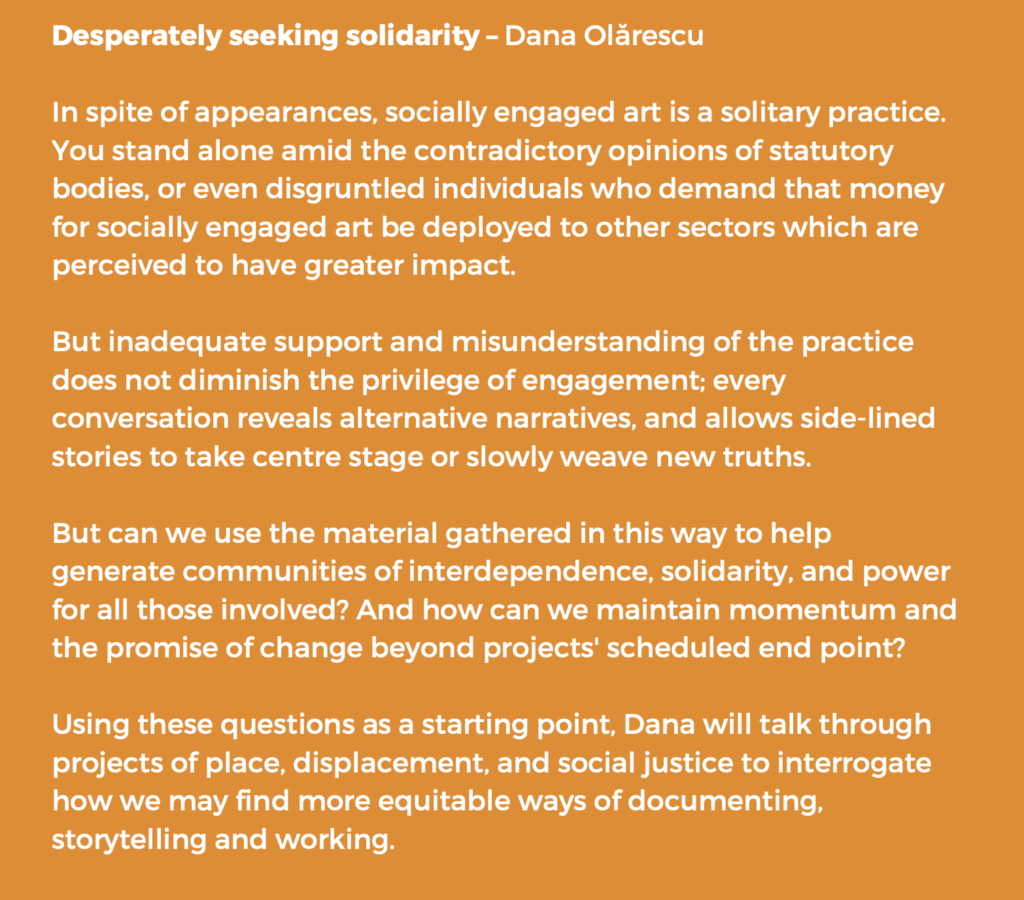
Investigative journalists, on the other hand, use methods that are systematic and in-depth, resulting in original research and the reporting/unearthing of information that has been concealed to the public. The journalistic method often pioneers new techniques in its embrace of digital platforms and data. Using public records, social media, and data with a focus on social justice and accountability and a form of storytelling characterized by depth and the need for accuracy. Generally, the journalistic method is reliant on primary sources to test hypotheses by way of rigorous fact-checking and verification of sources.
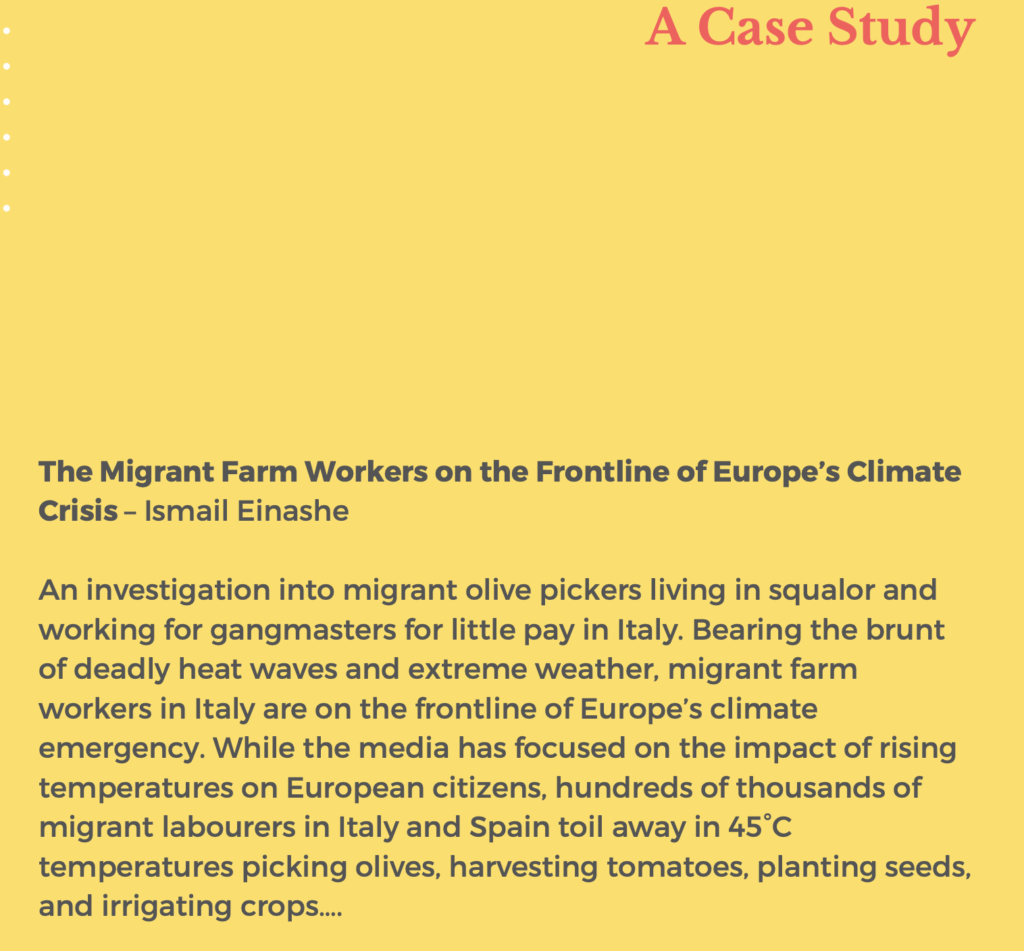
Our collective aim at Collaborative Incubator 3 was to bridge and integrate these different yet complimentary ways of working. To learn from each other through a mutual exchange of methodologies, evidence, content, and different forms of media, including social media and virtual platforms.
A key methodological goal in this project is to move beyond narrowly humanistic stories (often presented as individualistic morality tales) about migrants and community displacement, to research, map and communicate a more interconnected, systemic story. A story about displacement that is shaped by multiple points of entry across a complex ecosystem, featuring many actors, places, structures, and sectors. A story that is inter-sectoral/sectional, comprising intricate relationships between the spheres of health, education, human rights and crimes against humanity, environmental destruction, housing, family and community.
We framed the days in Berlin around the following areas:
· Investigative practices and trauma-based storytelling (case studies of mixed methodologies)
· Place-based socially engaged art practice (case studies of situated knowledge and neighbourhoods)
· The relevance of history – colonialism, migration, and Europe (reparative perspectives)
· Digital platforms and open source (case studies of current practices)
· Amplifying stories and new digital platforms (case studies of current practices)
· Truth-telling & crafting new narratives (sources, verification, and evidence)
· Embedding evaluation as part of the storytelling process ·Archive of mixed practices (who is doing what and where?)
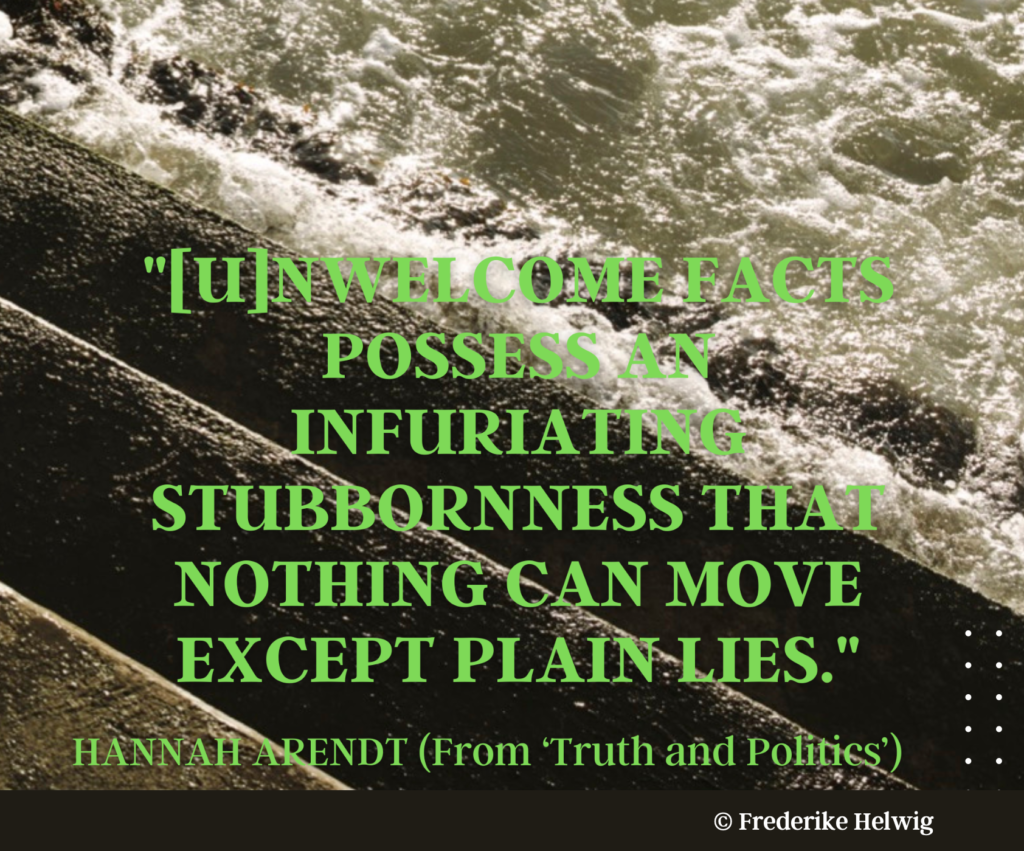
Collaborative Incubator 3 comprised a mix of formats – thought-pieces, provocations, case studies and workshops – allowing for a range of contributions. Our goal by day 3 was to launch a collaborative commission between socially engaged artists, investigative journalists and digital activists. Running from February – May 2023 this will then provide content for a final Resource Kit to be disseminated through wider networks. See here for the full programme.
Collaborative Commissions
Following the in-person gathering in Berlin, 4 practitioners were selected for the pilot commissions. The selected practitioners were invited to establish an exploratory baseline for collaborative thinking, mutual exchange and the testing out of ideas: Artist and activist, Dana Olarescu, Curator and writer, Dominijk Czechowski, Investigative Journalist, Daniel Trilling, and fillmmaker and activist, Ashish Ghadiali. These commissions will run from February – May 2023 with the goal of presenting prototypes for methods and approaches to storytelling.
In addition to the Collaborative Incubator in Berlin, several of the commissioned artists and journalists took part in an experimental exchange of ideas at an Allies in Practice session at MozFest on 22 March 2023
Framed as follows: The mass displacement of people is likely to be a defining feature of the 21st century. Climate change, war and instability, and systemic inequality all challenge our established ways of thinking and talking about migration. Are there new forms of storytelling that would help us meet the challenge? How would new technology shape that? This panel presents work in progress from Beyond the Now’s “collaborative incubator” – an experimental exchange of ideas between journalists and socially-engaged artists.
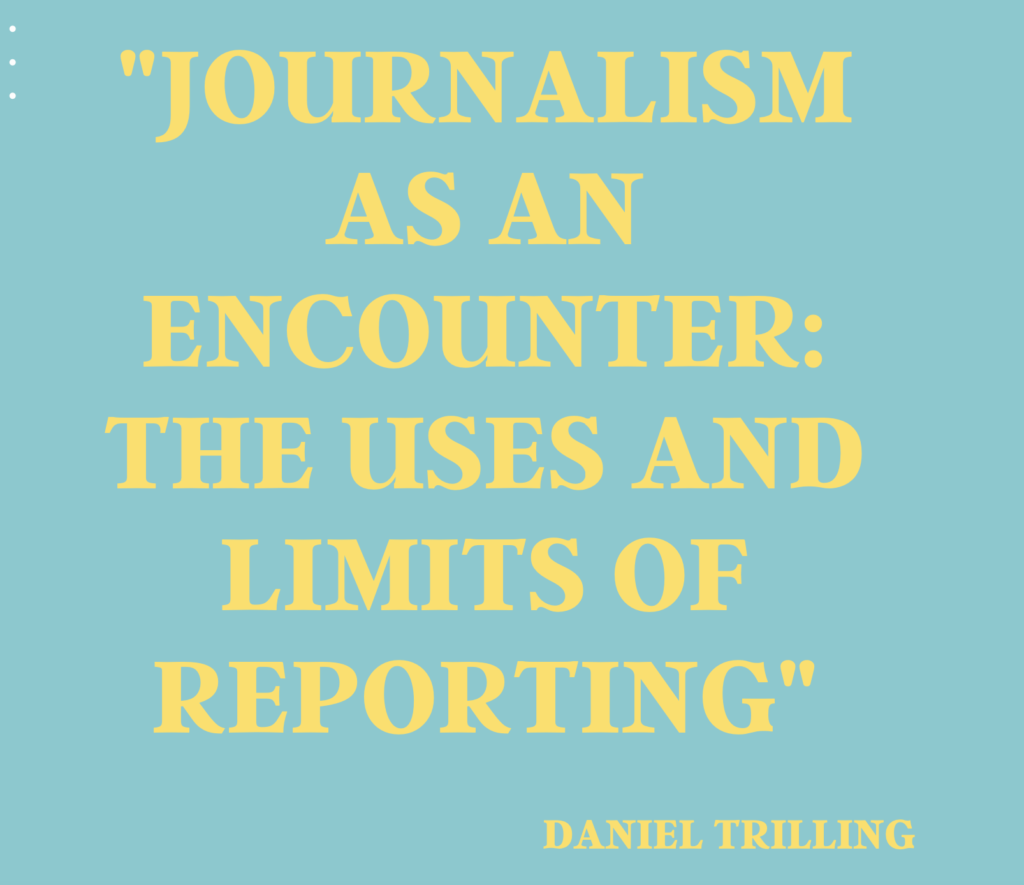
Artist Dana Olarescu, curator Dominik Czechowski and journalist and author Daniel Trilling are currently engaged in a research project in Palermo, Sicily aimed at drawing links between people’s experiences of displacement and the global systems that govern our lives. Two of the group will talk about their work, joined by experts in Digital Anthropology, Kit Braybrooke and Sarah Lemiem, Journalist. Moderator: Daniel Trilling
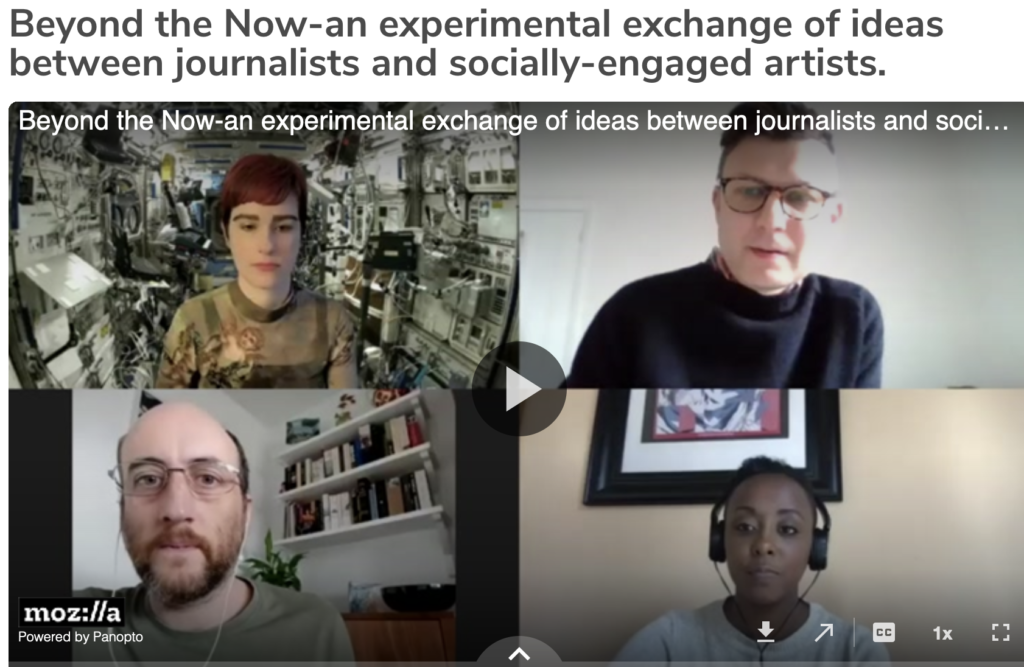
Collaborative Commissions: Palermo Field Trip:
The commissioned artists traveled to Palermo in April to do collaborative field work and to meet with migrant organisations, activists, artists and dwellers across the city.
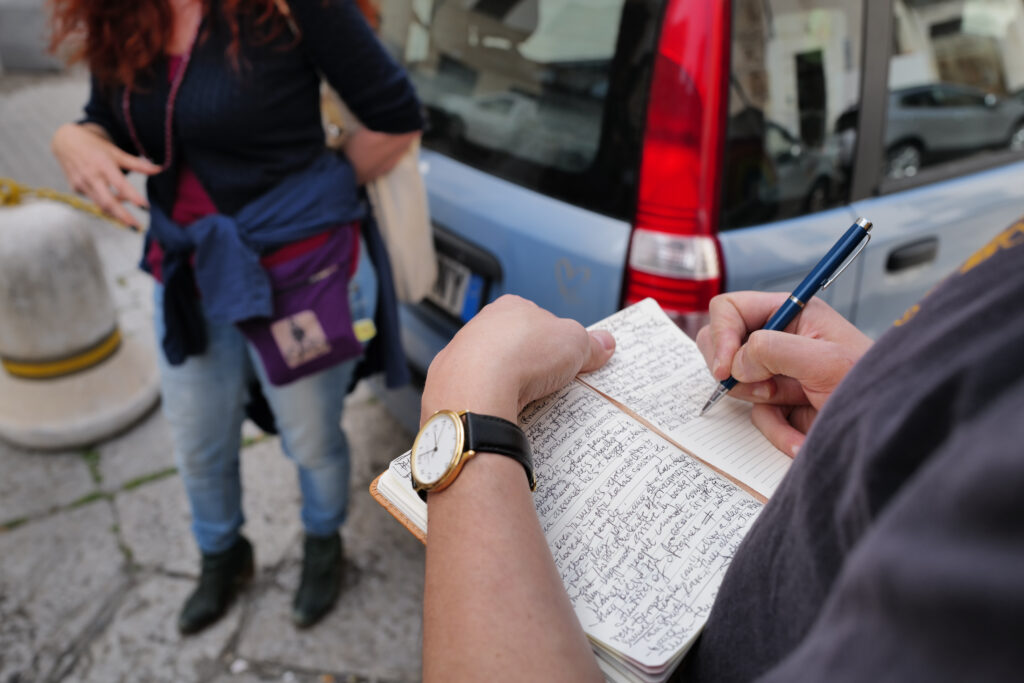
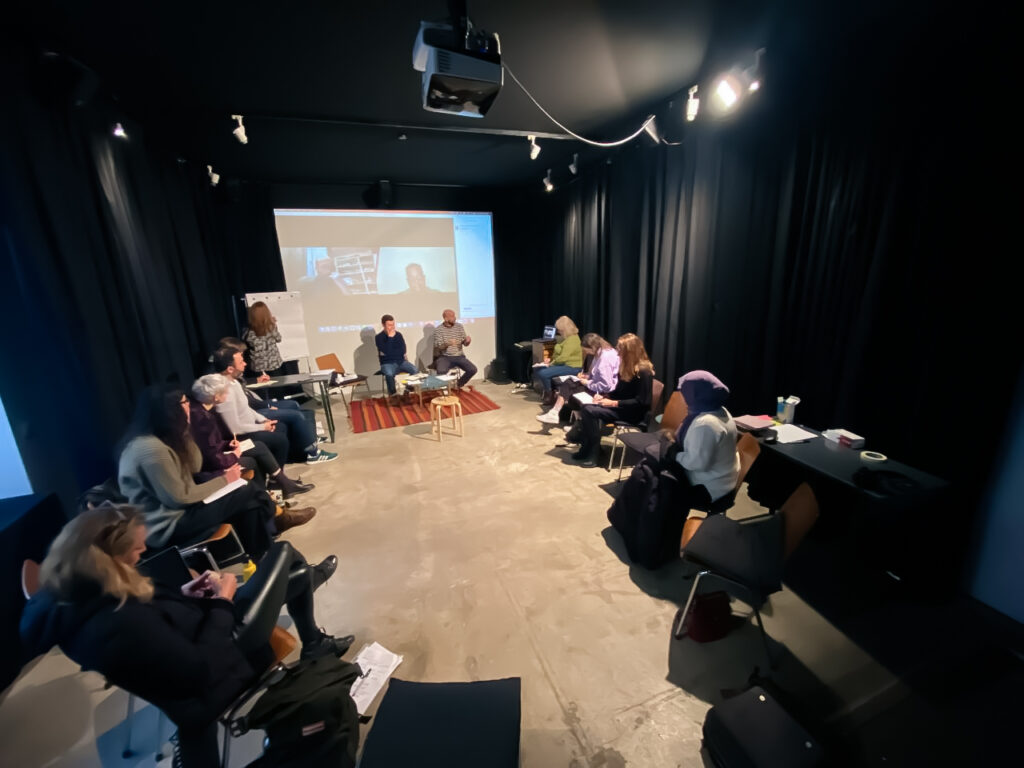
Moltivolt is a social enterprise that promotes food as a tool for dialogue between different people and cultures. They advocate for a world without borders, where every person has the right to move to follow their dreams and satisfy their needs regardless of where they are born. Moltivolti.org
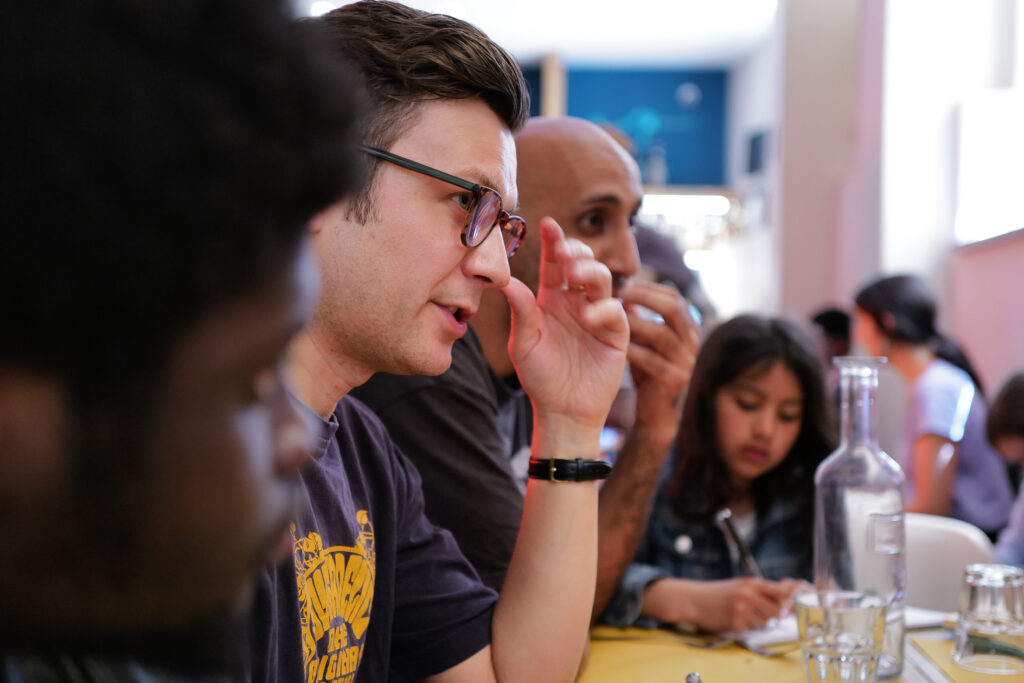
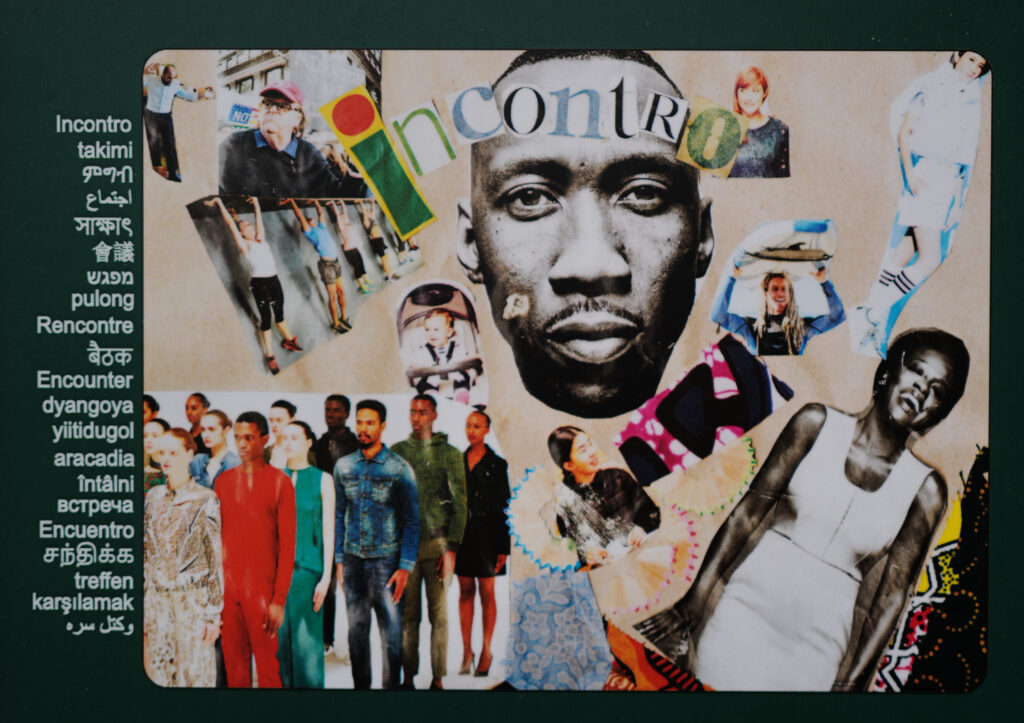
Giocherenda.it is a human development and cooperation project – comprising a group of creative young people who create games which ignite narratives and foster an attitude of sharing. Giocherenda comes from pulaar (an African language) and it means ‘solidarity, awareness of interdependence, strength through sharing, the joy of doing things together’. https://giocherenda.it/
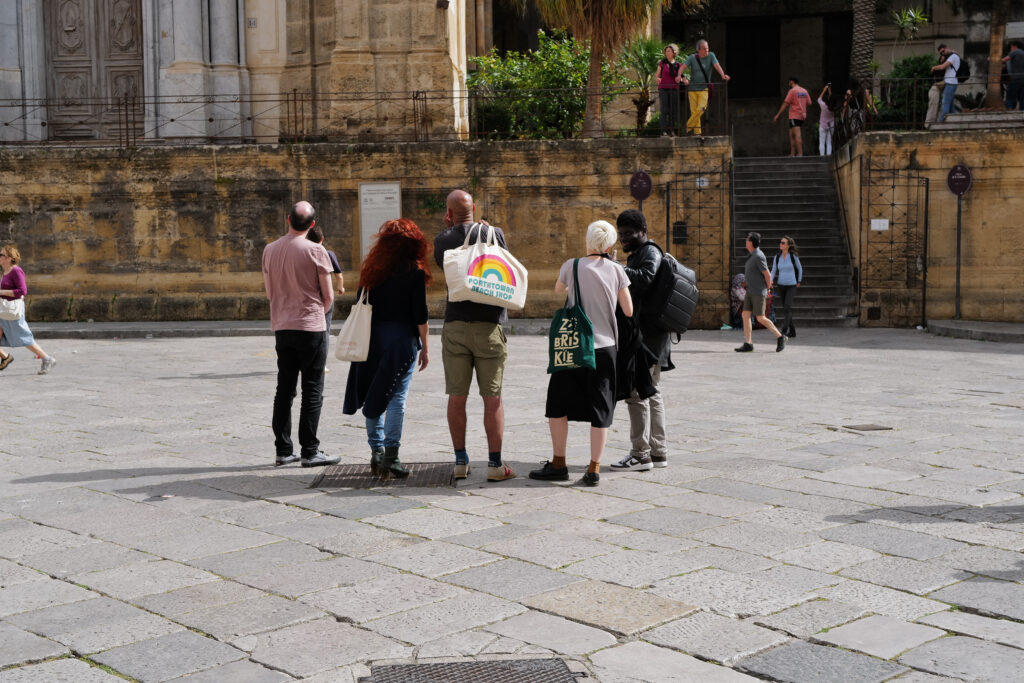
Final Toolkit
The commissioned artists are now completing their prototypes and the 3-Part Collaborative Incubator is being transcribed and edited with the goal of producing an online Handbook. This Handbook will form the 5th milestone of the Collaborative Incubator and will be disseminated and accessible online.
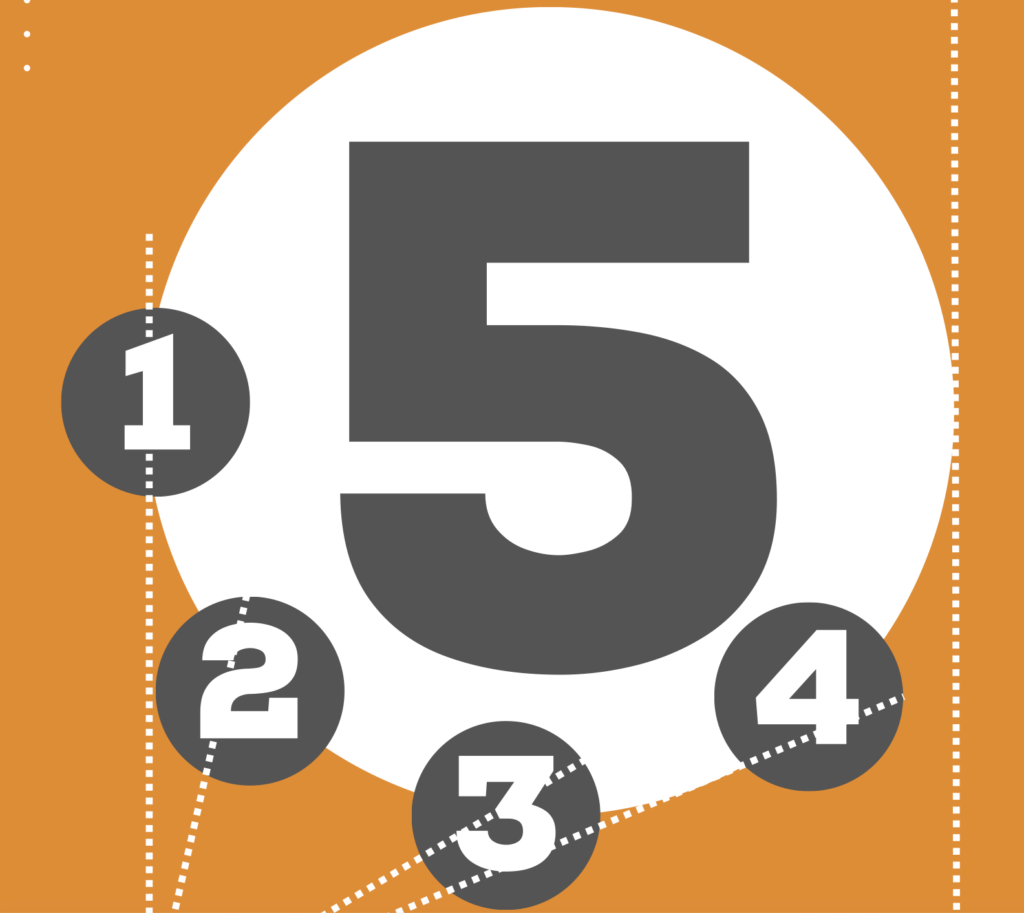
*Beyond the Now:
Beyond the Now is a syndicated social practice platform working across curation, commissioning, research and production. It aims to open up new creative cultural and political affinities for a post-pandemic world. We comprise small to medium arts organizations:
Counterpoints Arts, (UK: https://counterpointsarts.org.uk/);
Ettijahat-Independent Culture (Beirut and Brussels https://www.ettijahat.org/site/index)
coculture (Berlin https://www.coculture.org/)
Create (Ireland https://www.create-ireland.ie/)
in addition to individual researchers and producers working at:
Open University (UK https://www.open.ac.uk/)
Arts University Plymouth (UK https://www.aup.ac.uk/)
Mozilla Festival (Amsterdam https://www.mozillafestival.org/en/)